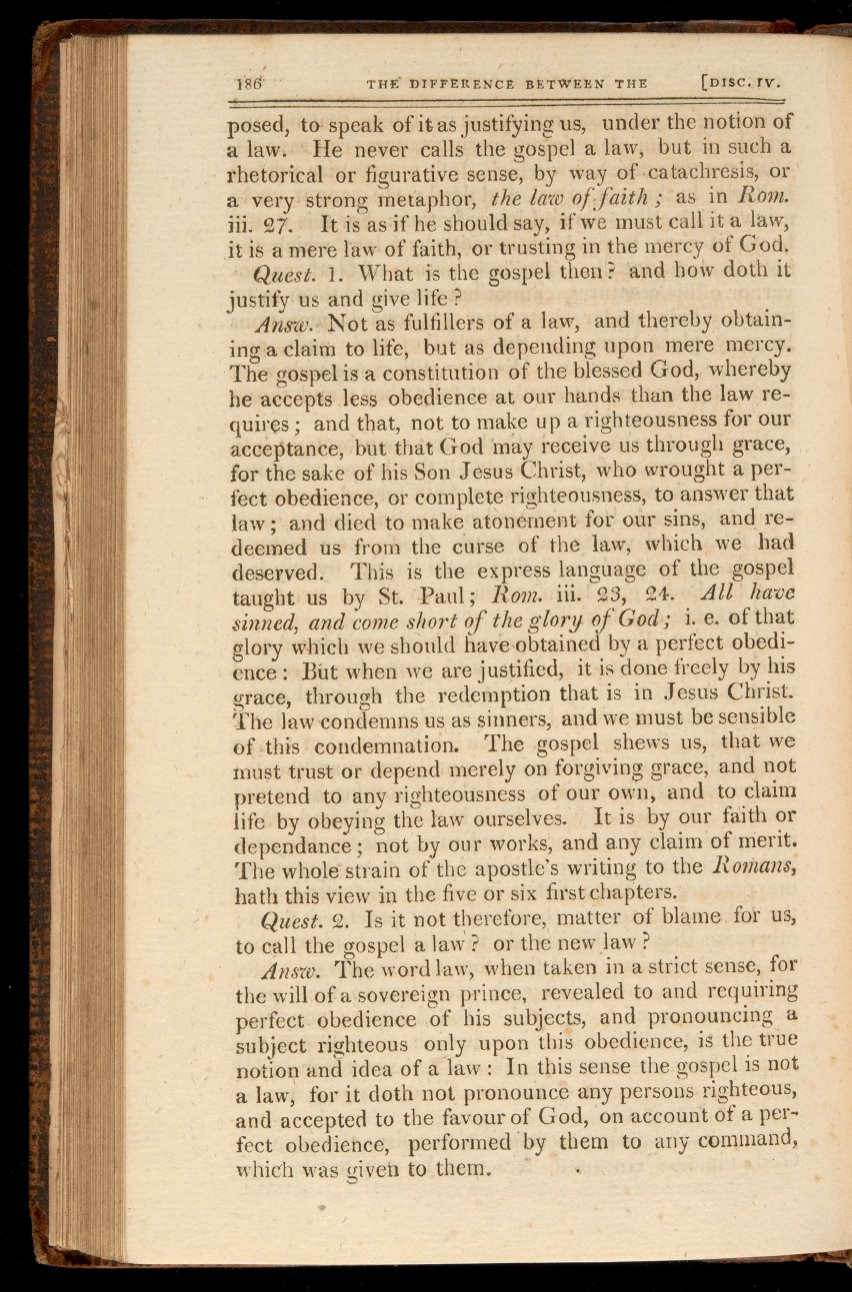

i86
THE.
DIFFERENCE
BETWEEN THE
[DISC. IV.
posed,
to
speak
of
it
as
justifying
us,
under
the
notion
of
a
law.
He
never
calls
the gospel a
law,
but
in
such a
rhetorical
or figurative
sense,
by
way
of
,catachresis,
or
a
very
strong metaphor,
the
law
offaith
;
as
in
Rom.
iii. 27.
It
is
as
if
he
should
say,
if
we
must call it a
law,
it
is
a
mere
law
of
faith,
or
trusting
in the mercy
of God.
Quest.
1.
What
is
the gospel
then
?
and
how
doth it
justify
us
and
give life
?
Answ.
Not
as fulfillers
of
a law,
and thereby obtain
-
ingea
claim to
life,
but
as
depending upon
mere
mercy.
The
gospel
is
a
constitution of the blessed God,
whereby
he
accepts
less
obedience
at
our hands than the
law
re-
quires;
and that,
not
to
make
up
a
righteousness
for
our
acceptance, but
that
God
may receive
us
through
grace,
for the sake of
his
Son
Jesus
Christ,
who
wrought a
per-
fect obedience,
or complete righteousness, to answer
that
law
;
and
died to make
atonement
for our
sins,
and
re-
deemed
us from the
curse
of
the
law, which
we
had
deserved. This
is
the express
language
of
the gospel
taught
us by
St. -Paul
;
Rom.
iii. 23, 24.
All
have
sinned,
and
come
short
of
the
glory
of
God;
i. e.
of that
glory which
we
should have,obtained
by
a perfect obedi-
ence
:
Bút
when
we
are justified,
it
is
done
freely
by
his
grace,
through
the
redemption
that
is
in
Jesus
Christ.
The
law
condemns
us
as
sinners, and
we
must
be
sensible
of
this
condemnation.
The
gospel
shews
us,
that
we
must trust or
depend merely
on
forgiving grace,
and not
pretend
to any
righteousness
of
our
own,
and
to
claim
life
by
obeying the
law ourselves.
It
is
by
our faith or
dependance
;
not by
our
works;
and
any claim
of
merit.
The
whole
strain of
the
apostle's
writing to
the
Roañans,
hath
this
view
in
the
five
or
six
first chapters.
Quest.
2.
Is it
not
therefore,
matter of
blame.
for
us,
to
call
the
gospel a law
?
or
the
new law
?
Answ.
The
word
law,
when
taken
in a
strict
sense, for
the
will
of
a sovereign
prince, revealed to and
requiring
perfect
obedience
of
his
subjects,
and pronouncing a
subject
righteous
only
upon
this obedience,
is
the true
notion and idea
of
a
law
:
In
this sense the
gospel
is
not
a
law;
for
it doth not pronounce
any persons righteous,
and accepted
to
the favour of
God,
on
account of
a
per-
fect obedience, performed
by
them
to any command,
which
was
given to
them.

















